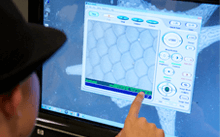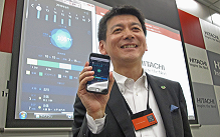How many of you truly enjoy working? While work is a necessary activity for most people, it also provides a sense of purpose for our lives. Nevertheless, we are often stressed or worried by various aspects of work, from performance evaluation to compensation and relationship with colleagues.
Also, when people feel “forced” to work, they may not only be unable to work happily, but they will also lose self-initiative and motivation, which may lead to a lower productivity. In such sense, it is crucial for a company to respect employees’ individuality and self-initiative in order to make the workplace more enjoyable and improve employees’ QoL (Quality of Life).
One way to realize a happy work style is to visualize the “happiness” of each individual employee, that is, to measure and track happiness in some way, and to execute plans to improve the measured results. “Happiness Planet,” a smartphone application that supports work-style reform tailored to each person and organization, is a possible solution for the future of work.
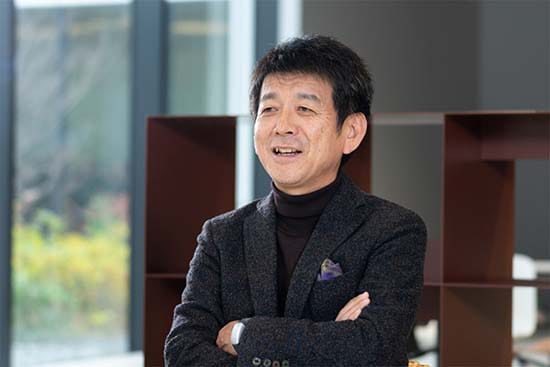
A Hitachi, Ltd. fellow and Happiness Project leader of the Future Investment Division,Kazuo Yano
(Photo: Daisuke Yoshinari)
“I wanted to increase the productivity of knowledge labor by 50 times,” says Kazuo Yano, a fellow at Hitachi Ltd., a developer, and a leader of the Happiness Project of the Future Investment Division, speaking about the trigger that led to the development of “Happiness Planet.” According to Peter F. Drucker, who is often referred to as the “father of management,” the scientific management method proposed by Frederick W. Taylor increased the productivity of manual labor in manufacturing more than 50-fold in the 20th century. But Drucker also wrote in his book, Post-Capitalist Society (1993), that increasing the productivity of knowledge labor will be the greatest achievement of the 21st century. If the productivity of knowledge labor can be increased 50 times by using IT, “A completely new society should appear. That's why I wanted to take on this huge topic,” says Yano.
Yano, who thought that, unlike simple work, knowledge labor requires a better state of mind for workers to increase productivity, has examined numerous psychological research papers. “We've seen an increase in research papers revealing the relationship between productivity and happiness from data. Happiness has proven to be closely related to the productivity of knowledge labor,” says Yano.
Over the past two decades, significant discoveries and concepts have been identified in academic research on happiness and productivity, and the factors behind it has progressed rapidly. “Psychological safety” is particularly gathering attention among them. For instance, in organizations with hierarchical relationships, each person is constantly being evaluated by someone, so there is always the option of lowering the risk of being judged poorly by avoiding to make assertions. In contrary, “psychological safety” refers to a good relationship where one can overcome these problems and speak frankly. When “psychological safety” declines, it leads to a decline in employee happiness, lower productivity and creativity, lower mental and physical health, turnover, and even accidents.
“We succeeded in using technology to objectively quantify good relationships, something we were unable to measure until now. In addition, we discovered that good organizations are characterized by sufficient human connection, equality among team members, and synchronized physical movements when another person is speaking,” says Yano. In 2020, Yano's group was awarded the Frederik Philips Award by the IEEE (Institute of Electrical and Electronics Engineers), the world's largest institute of electrical and electronics, for its achievements in this scientific discovery involving humans and its related technology.
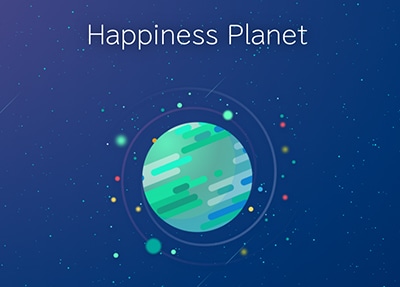
“Happiness Planet” is a technology that draws out our “positive mind” and “trustworthy relationships” through work, thereby supporting the positive implementation of management policies. Psychological safety can be measured quantitively, and technology can be utilized to improve it. A numerical value of a common measurement of “what makes people happy” can be confirmed and tracked daily, thus human relationships can also be improved. Only a smartphone application is required, allowing anyone to begin participating today.
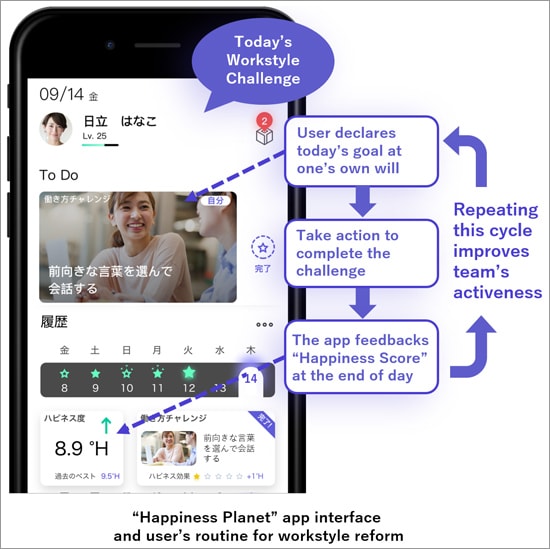
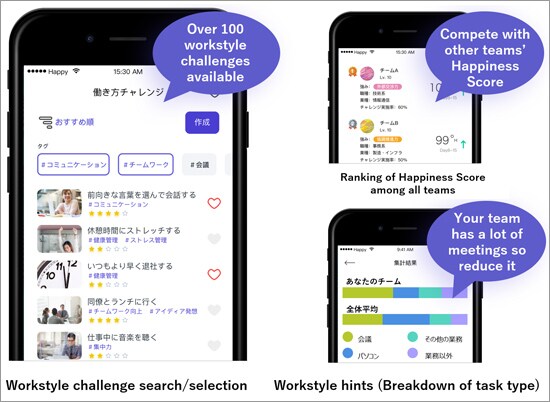
There are two main functions installed in the application. One is a function that implements day-to-day actions. Every morning, users can choose and declare what they have decided to take action as a “challenge” for that day, such as, “carefully listen to people” or “ask someone else to do something that doesn’t have to be done by myself.” In the evening, the application will report on the results of the challenge. Doing this even for one minute a day has enough power to shift one’s state of mind in a positive direction. It has been verified that by making this a daily routine, the mind becomes more positive.
The second function is the function of measuring good relationships. The measured results are quantified as a unique index, which the development team calls “social happiness index”. Not many people speak directly when they express empathy and trust in others, and the same goes for distrust or rejection toward others. Rather, they express their sentiments by unintentionally synchronizing their body language with the other person or not synchronizing at all. This nonverbal communication is the instinctive ability of humans, including infants. Over the past 10 years, Hitachi developers have used a wearable device technology to measure their own behavioral data, totaling up to more than 10 million person-days. From these results, they found that happy, empathetic, and trusting relationships causes a certain pattern in unconscious physical movement.
In the “Happiness Planet” app, this characteristic pattern is extracted by using an acceleration sensor mounted on the smartphone and then converted to a happiness level score. This can be detected if the user keeps a smartphone on his/her body for three hours or more during the day. In organizations with a high happiness level it has been verified that order received is approximately 30% more, both in call centers and in corporate sales.
In addition, there is a feature that displays the average of happiness level on a team-by-team basis for the same work task. Every day, each person declares a challenge to colleagues in his/her team, and the members can cheer for each other on the app interface. During this period, the application monitors the social happiness level and verifies which action during the day caused an increase in the social happiness level. By repeating this cycle, it will be possible to increase the level of happiness and productivity of the entire organization.
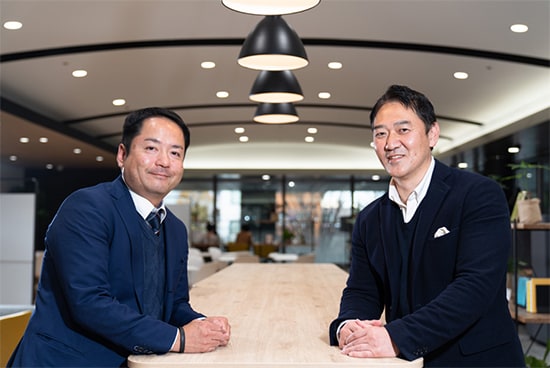
Nobuo Ikeda, director of Event Development Department, Marui Co., Ltd., which is a group company of Marui Group Co., Ltd. (right), and Munea Inagaki, manager of Group Process Innovation at M-and-C Systems Co., Ltd.’s R&D Center (left); they are also members of the “Wellness Management Promotion Project,” a cross-group certified project.
(Photo: Daisuke Yoshinari)
Hitachi has conducted Proof of Concepts with the "Happiness Planet" app since 2018. Four user-participatory PoC has been held, called the “Work Style Festivals.” The “Work Style Festivals” are held over a period of approximately three weeks and participants are required to form a team of at least five people. In addition to competing “social happiness index” of each team, a daily challenge is declared every day which can also be shared with the other teams, including those from different companies. A total of 4,300 employees from 83 companies have participated in the four tests so far.
The Marui Group is one of the companies that has actively participated in the “Work Style Festivals.” In its “Marui Group Vision 2050”, the company aims to "create an inclusive and prosperous society in which all people can experience 'happiness.'” The “Wellness Management Promotion Project Team” has been formed to support the realization of this vision.
One of the major issue that the project team had is that there seemed to be no index to evaluate people’s happiness. “When we were searching for various ways to quantify happiness, I learned about Hitachi's technology and tried to think of ways to utilize it,” says Mr. Nobuo Ikeda, general manager of the Event Development Department at Marui.
At the “Work Style Festival” held in February 2019, a total of 300 employees participated in 43 teams from the Marui Group. A total of 133 teams participated in the “Work Style Festival” that time, and the team to win first place was the Marui Group team. “At that time, the Machida (Tokyo) store team, where I was the store manager, consisted of employees from different job types and ages. The result clearly showed that the team’s happiness level was relatively high on days when the team tried something new, such as hosting a party with store tenants and interacting with people with disabilities at local facilities,” said Mr. Ikeda. He said that the experience helped him realize that having self-initiative increases one’s degree of happiness.
Since then, the Marui Group has adopted a policy of actively utilizing “Happiness Planet”, and at the “Work Style Festival” held in September 2019, nearly twice as many employees have participated, with a total of 80 teams and 598 employees.
At “Work Style Festivals,” relationships within teams are activated by encouraging teams to compete with each other. “The benefit is that there is increased communication between the members who use it," says Mr. Munea Inagaki, manager of Group Process Innovation at M-and-C Systems Co., Ltd.’s R&D Center. The festival allows people to send feedbacks and comments on other people's daily challenge declaration and actively share their happiness level.
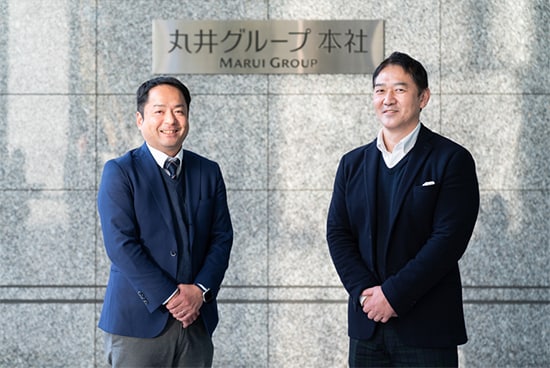
(Photo: Daisuke Yoshinari)
Another effect of using the application that it enables us to create good habits, according to Mr. Ikeda. Declaring a challenge every day and checking the results at the end of the day can become a positive habit that can improve one’s happiness level“ Every day, we can measure our happiness level to check our well-being, just like we measure our body temperature” Mr. Ikeda says.
“The platform for measuring happiness of the 'Happiness Planet' can be applied to a variety of social activities in the future,” says Yano. Today, there are a variety of social issues, including a declining birthrate and an aging population, climate change, and the aging social infrastructure. In order to resolve these social issues, it is important for each person to make positive actions in the community. “Happiness Planet” app is something that can encourage us to make small but positive changes. For instance, in order to create a “happy city," we can examine the data gathered by this technology to track and verify the happiness of the entire community.
Hitachi is committed to creating societies that maximize people’s happiness. By measuring and visualizing “what makes people happy”, we may improve various social activities, from product and service development to urban planning and policymaking, and all these activities can function more effectively as a means of making people happy. Through the development of “Happiness Planet”, Hitachi will continue to work with various industry partners to create a platform that will improve Quality of Life for all.
* “Happiness Planet” application is currently available in Japanese only.
Release Date: March 2020
Solutions By: Hitachi, Ltd., R&D Group


